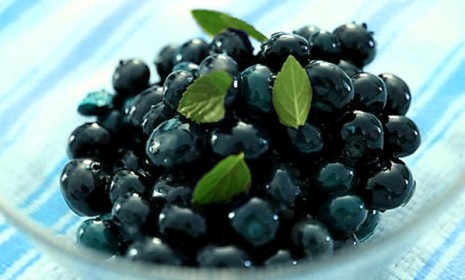The fake blueberries uproar
Do you love blueberry cereal? Read the label — you might not be eating what you think you are

A free daily email with the biggest news stories of the day – and the best features from TheWeek.com
You are now subscribed
Your newsletter sign-up was successful
Blueberries are prized not just for their flavor — they're also full of antioxidants, vitamins, and fiber. The hype surrounding their health benefits "translates into marketing gold for major food manufacturers," says Lauren Marmaduke in Houston Press. But a recent investigation found that many so-called blueberry cereals, muffins, bagels, and other foods are not filled with as much blueberry goodness as customers might expect. Here, a guide:
What did the investigation find?
Many big-name blueberry products contain few or no blueberries at all, according to a report by Mike Adams (also known as "The Health Ranger") at Natural News. Kellogg's Frosted Mini Wheats Blueberry Muffin variety, for example, has no blueberries, according to Adams, just "blueberry flavored crunchies" — a mix of sugar, corn syrup, starch, hydrogenated oil, artificial flavors, and artificial food dyes. Total Blueberry Pomegranate cereal contains neither blueberries nor pomegranates. And Target blueberry bagels have blue bits that are actually sugary, cellulose gum concoctions. (Watch a report about the findings)
The Week
Escape your echo chamber. Get the facts behind the news, plus analysis from multiple perspectives.

Sign up for The Week's Free Newsletters
From our morning news briefing to a weekly Good News Newsletter, get the best of The Week delivered directly to your inbox.
From our morning news briefing to a weekly Good News Newsletter, get the best of The Week delivered directly to your inbox.
Why scrimp on the berries?
"Real blueberries are expensive; faking them is cheap," says Amy Kuras at The Stir.
What are food companies saying about this?
The companies told Fox News they make no effort to hide what's really in the products. Kellogg's issued a statement saying its "products labeled 'blueberry' include dried or pureed blueberries, or blueberry juice concentrate," and "are labeled in compliance with applicable laws and regulations." General Mills said its Total Blueberry Pomegranate cereal "contains blueberry flavoring, and the package communicates that the product is 'naturally and artificially flavored.'"
A free daily email with the biggest news stories of the day – and the best features from TheWeek.com
How can consumers spot the fakes?
Easy. "Read the fine print," says Sarah Parsons at Change.org's Sustainable Food, and avoid products that contain no blueberries — or, to express your outrage faster, sign a petition urging them to stop their "misleading advertising." You can also buy products, including many organic cereal brands, that contain real berries, but they tend to be more expensive. Or simply "buy blueberries fresh in season and frozen during the rest of the year," says Kuras at The Stir, "and add your own blueberries to muffins and cereal. That way you know you're getting every bit of the good stuff that you're paying for."
Sources: Natural News, Houston Press, The Stir, Fox News, Sustainable Food
-
 Why is the Trump administration talking about ‘Western civilization’?
Why is the Trump administration talking about ‘Western civilization’?Talking Points Rubio says Europe, US bonded by religion and ancestry
-
 Quentin Deranque: a student’s death energizes the French far right
Quentin Deranque: a student’s death energizes the French far rightIN THE SPOTLIGHT Reactions to the violent killing of an ultraconservative activist offer a glimpse at the culture wars roiling France ahead of next year’s elections
-
 Secured vs. unsecured loans: how do they differ and which is better?
Secured vs. unsecured loans: how do they differ and which is better?the explainer They are distinguished by the level of risk and the inclusion of collateral